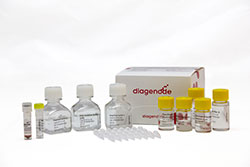Sharma G et al.
A mammalian cell utilizes DNA methylation to modulate gene expression in response to environmental changes during development and differentiation. Aberrant DNA methylation changes as a correlate to diseased states like cancer, neurodegenerative conditions and cardiovascular diseases have been documented. Here we show genome-wide DNA methylation changes in macrophages infected with the pathogen M. tuberculosis. Majority of the affected genomic loci were hypermethylated in M. tuberculosis infected THP1 macrophages. Hotspots of differential DNA methylation were enriched in genes involved in immune response and chromatin reorganization. Importantly, DNA methylation changes were observed predominantly for cytosines present in non-CpG dinucleotide context. This observation was consistent with our previous finding that the mycobacterial DNA methyltransferase, Rv2966c, targets non-CpG dinucleotides in the host DNA during M. tuberculosis infection and reiterates the hypothesis that pathogenic bacteria use non-canonical epigenetic strategies during infection.


